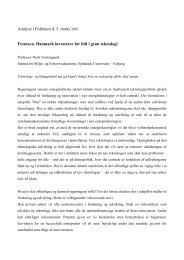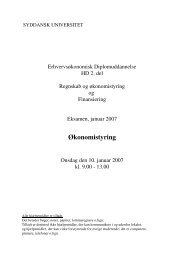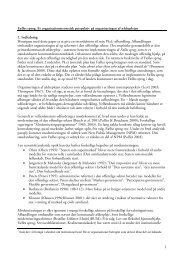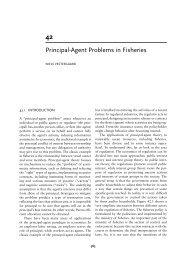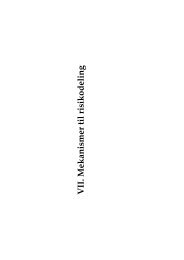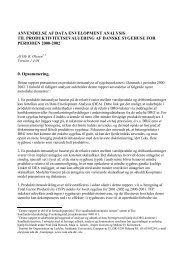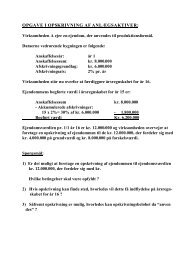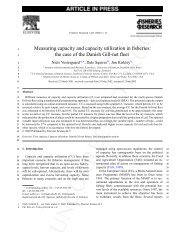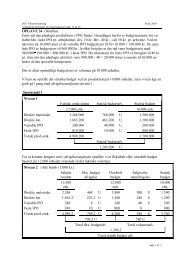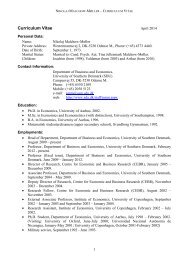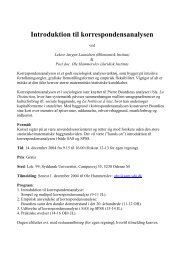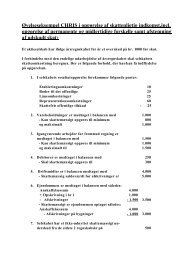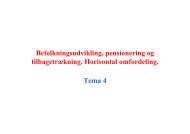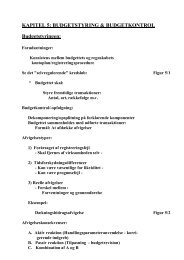medic<strong>in</strong>e, changes <strong>in</strong> the labour code, limitations on work <strong>of</strong> pensioners led to decrease the popularsupport. As regards the economic policy disagreements erupted between the two economicm<strong>in</strong>isters, Grzegorz Kolo<strong>dk</strong>o <strong>and</strong> Jerzy Hausner. Opposite Kolo<strong>dk</strong>o, Jerzy Hausner was will<strong>in</strong>g toloosen the f<strong>in</strong>ance policy by <strong>in</strong>creas<strong>in</strong>g the deficit on the state budget, thereby neglect<strong>in</strong>g theMaastricht criteria <strong>and</strong> maybe future Polish membership <strong>of</strong> the euro zone. The strategy <strong>of</strong>negotiat<strong>in</strong>g about EU membership became “s<strong>of</strong>ter” <strong>and</strong> at the same time also more realistic, thoughthere have been several disagreements <strong>in</strong>side the second SLD-PSL government about thenegotiat<strong>in</strong>g strategy, especially the chapters that were deal<strong>in</strong>g with agriculture. In the end, thepeasants party (PSL) was forced to leave the government due to lack <strong>of</strong> vot<strong>in</strong>g discipl<strong>in</strong>e <strong>in</strong>parliament.In March 2003 Leszek Miller <strong>and</strong> Alex<strong>and</strong>er Kwasniewski agreed to hold new election <strong>in</strong> June2004, at the same time as the first Polish election to the European Parliament. That decision,however, was revised after the victory for the government at the EU referendum <strong>and</strong> the vote <strong>of</strong>confidence to the SLD-UP government <strong>in</strong> the parliament just after the referendum. At the secondSLD party congress <strong>in</strong> July 2003 Leszek Miller was re-elected as chairman <strong>of</strong> SLD, but severaldeputies decided to absta<strong>in</strong> from vot<strong>in</strong>g. On the March 2003 congress Miller expressed at leastsome self-criticism. Accord<strong>in</strong>g to the op<strong>in</strong>ion polls, the fall <strong>in</strong> confidence to the governmentcont<strong>in</strong>ued after the congress <strong>and</strong> the EU referendum <strong>and</strong> the Polish veto <strong>in</strong> Rome on the new EUconstitution treaty <strong>and</strong> the fall <strong>in</strong> voter support was even re<strong>in</strong>forced due to the ongo<strong>in</strong>g politicalsc<strong>and</strong>als, the Ryw<strong>in</strong>-affair (corruption <strong>in</strong> the media) <strong>and</strong> the <strong>in</strong>volvement <strong>of</strong> SLD-deputy AndrzejJagiello, <strong>in</strong> a local affair concern<strong>in</strong>g close l<strong>in</strong>ks between local SLD-people <strong>and</strong> the mafia (the“Starachowice affair”). Aim<strong>in</strong>g to br<strong>in</strong>g to the public the impression that SLD tried its best toovercome corruption among its members a screen<strong>in</strong>g <strong>of</strong> the party members was <strong>in</strong>troduced,however with a limited impact. The plan about reconstruction <strong>of</strong> state f<strong>in</strong>ances (“the Hausner-plan”)with cuts <strong>in</strong> social expenditures received broad support among economists <strong>and</strong> <strong>in</strong>ternationalf<strong>in</strong>ancial <strong>in</strong>stitutions, but not <strong>in</strong> the Polish population <strong>and</strong> the plan was rejected also by the liberalparty Civic Forum (PO).Some observers shared the op<strong>in</strong>ion that SLD might split up <strong>in</strong> more parties, one <strong>of</strong> them might beled by Alex<strong>and</strong>er Kwasniewski or by the marshall <strong>of</strong> the Sejmen Marek Borowski, thereby SLDwould be shar<strong>in</strong>g the fate <strong>of</strong> AWS <strong>and</strong> maybe disappear from the political scene. As noted byTomasz Zykowski at least two different left attitudes were represented <strong>in</strong> SLD, on the one sidecultural l<strong>in</strong>e that critisized the <strong>in</strong>fluence <strong>of</strong> the church on politics <strong>and</strong> dem<strong>and</strong><strong>in</strong>g changes <strong>in</strong> therestrictive abortion laws, the other social argu<strong>in</strong>g <strong>in</strong> favour <strong>of</strong> state regulation <strong>in</strong> the economicpolicy <strong>and</strong> upkeep<strong>in</strong>g the exist<strong>in</strong>g social wellfare programmes 92 . Due to <strong>in</strong>cessant fall <strong>in</strong> electoralsupport Leszek Miller (like Schröder <strong>in</strong> Germany) was forced to leave the post as the chairman <strong>of</strong>the SLD. At the party convention <strong>in</strong> March 2004 Krzyst<strong>of</strong> Janik was elected as the new partychairman, but at least for some time Leszek Miller was still holdn<strong>in</strong>g the post as Prime M<strong>in</strong>ister.But that was only the beg<strong>in</strong>n<strong>in</strong>g. In spr<strong>in</strong>g 2004, due to the ongo<strong>in</strong>g fall <strong>in</strong> electoral support, downto 10-13 pct., <strong>and</strong> loss <strong>of</strong> several voters to the liberal Civic Platform (PO) <strong>and</strong> the populist“Selfdefence” (Samoobrona) Leszek Miller was forced to resign as party chairman <strong>and</strong> later also aspremier. The ma<strong>in</strong> problem was not lack <strong>of</strong> leadership cohesion <strong>and</strong> loyalty such as had been thecase <strong>in</strong> the Solidarity Election Alliance (AWS), but bad governance <strong>and</strong> the <strong>in</strong>cessant fall <strong>in</strong>electoral support. At the 2001 election SLD had ga<strong>in</strong>ed 42 <strong>of</strong> the votes, accord<strong>in</strong>g to op<strong>in</strong>ion pollsthat figure has barely 8 pct. after the party split <strong>in</strong> March 2004 <strong>and</strong> close to the treshold requirement92 Interview with Zykowski <strong>in</strong> Gazeta Wyborcza 26 February, 2004:3.98
<strong>of</strong> 5 pct. The fall <strong>in</strong> electoral support took place <strong>in</strong> spite <strong>of</strong> better macroeconomic performance with5 pct. growth <strong>in</strong> BNP <strong>and</strong> low <strong>in</strong>flation. A new “anti-Miller” successor social democratic party,Pol<strong>and</strong>s Social Democratic <strong>Party</strong> (SDPL) was established on the ru<strong>in</strong>s <strong>of</strong> the old SLD. Also somepeople from the Labour Union (UP) decided to jo<strong>in</strong> the new party. At the outset, the FreedomUnion (UW) declared itself open to discuss electoral cooperation with the “new social democrats”.The aim <strong>of</strong> the new party was to capture at least some <strong>of</strong> the votes lost to the Civic Platform (PO)<strong>and</strong> “Selfdefence” (Samoobrona). After some negotiations SDLP supported the establishment <strong>of</strong>Marek Belka’s “transition government”, <strong>in</strong> return obta<strong>in</strong><strong>in</strong>g some concessions on policy level, e.g.as regards de-politization <strong>of</strong> public adm<strong>in</strong>istration <strong>and</strong> more beneficial social regulations <strong>and</strong> alsosome important posts <strong>in</strong> the new transitory government. Furthermore, as a weakly <strong>in</strong>stitutionalizednew party the SDLP was <strong>in</strong> need <strong>of</strong> time <strong>in</strong> order to consolidate itself. In the mid 2004 SDLP wasestimated to have only about 7.000 members <strong>and</strong> “sympathizers” 93 . At the EP parliament election <strong>in</strong>June 2004 both SDLP <strong>and</strong> SLD passed the election treshold, both obta<strong>in</strong><strong>in</strong>g a modest 5-6 pct. <strong>of</strong> thevotes.2.16. The Labour Union (UP)From the outset the Labour Union (UP) claimed to present the non-communist, social democraticpart <strong>of</strong> the Left , a political association <strong>of</strong> “mixed” orig<strong>in</strong> <strong>in</strong> both the old <strong>and</strong> the new system. UPaimed to present itself as a “clean h<strong>and</strong>s party” without shares <strong>in</strong> the old system <strong>and</strong> the bad sides <strong>of</strong>the new post-communist. Despite <strong>of</strong>fers from SLD the Labour Union (UP) refused to enter theSLD-led government after the 1993 election, argu<strong>in</strong>g that the government followed a too liberaleconomic policy. However, the real explanation was historic, as the party leadership strived todistance itself from the “post-communists” <strong>and</strong> appear as an authentic non-communist left w<strong>in</strong>gparty.UP was established <strong>in</strong> 1992 after the unification <strong>of</strong> Works Solidarity (LS) <strong>and</strong> The DemocraticSocial Movement (DMS), both had a historical background <strong>in</strong> Solidarity. The <strong>in</strong>itiative to theformation <strong>of</strong> UP was taken by Aleks<strong>and</strong>er Malachowski <strong>and</strong> Ryszard Bugaj, an economist <strong>and</strong> one<strong>of</strong> former the experts <strong>of</strong> the Solidarity movement. Under the state <strong>of</strong> emergency <strong>in</strong> the 1980s Bugajhad been placed <strong>in</strong> <strong>in</strong>ternment camps. Also some members <strong>of</strong> the social liberal faction <strong>in</strong> Solidarityjo<strong>in</strong>ed UP.Thus the Labour Union (UP) especially appealed to reform m<strong>in</strong>ded members <strong>of</strong> the formercommunist party (PZPR) <strong>and</strong> Pol<strong>and</strong>'s Social Democratic Union (SUP). In most cases we weretalk<strong>in</strong>g about former members <strong>of</strong> PZPR who <strong>in</strong> the 1980’s had jo<strong>in</strong>ed the trade union Solidarity(“S”). The faction Works Solidarity (LS) was most dismissive about accept<strong>in</strong>g former communists<strong>in</strong> the party.Soon after the establishment <strong>of</strong> UP disagreement erupted regard<strong>in</strong>g future cooperation with the“post-communists”. The chairman <strong>of</strong> UP Ryszard Bugaj took a negative position, opposite thesuccessor on the post <strong>and</strong> the later m<strong>in</strong>ister Marek Pol took a more favourable one. However, theparty never refused to cooperate with SLD <strong>in</strong> more <strong>in</strong>formal ways, <strong>and</strong> due to Marek Pol’s positionas the m<strong>in</strong>ister <strong>of</strong> trade <strong>and</strong> <strong>in</strong>dustry <strong>in</strong> the SLD-PSL government 1993-97 UP was <strong>in</strong>directlyrepresented <strong>in</strong> the first “post-communist” government <strong>in</strong> spite <strong>of</strong> the fact that Marek Pol at leastformally left the UP.93 Trybuna 28 June 20004, “Teraz Belka”.99
- Page 3:
“This provisional situation chara
- Page 6 and 7:
marketisation and privatisationshor
- Page 8 and 9:
purposes, are channels for “expre
- Page 10 and 11:
the significance of strategic choic
- Page 12 and 13:
presidentialism gave rise to “flo
- Page 14 and 15:
antipolitics and reinforcement of a
- Page 16 and 17:
In the late 1990’s elections most
- Page 18 and 19:
determined primarily by “politica
- Page 20 and 21:
politics and antipolitics, all sign
- Page 22 and 23:
which attitudes to state regulation
- Page 24 and 25:
Anti-communism has been defined in
- Page 26 and 27:
elections and the Slovak communists
- Page 28 and 29:
Cartel agreementsbetter representat
- Page 30 and 31:
Basically the absence of clear cons
- Page 32 and 33:
After 1989 different types of polit
- Page 34 and 35:
complex project for transition unde
- Page 36 and 37:
window of opportunity in spite of s
- Page 38 and 39:
analyses of party institutionalizat
- Page 40 and 41:
political messages and slogans. Thu
- Page 42 and 43:
well established party culture may
- Page 44 and 45:
expected, much due to the many spli
- Page 46 and 47:
Furthermore, the polarisation on el
- Page 48 and 49: Finally, Solidarity can also be con
- Page 50 and 51: whole, on the one side an authorita
- Page 52 and 53: The economic recession and the grav
- Page 54 and 55: election defeat more cooperation an
- Page 56 and 57: The formation of AWS can be conside
- Page 58 and 59: group. RS AWS constituted the Chris
- Page 60 and 61: According to the original plans the
- Page 62 and 63: values. According to Rybicki, as so
- Page 64 and 65: AWS should fight against all types
- Page 66 and 67: 2001 parliamentary election, howeve
- Page 68 and 69: and workers voted ZChN. At the 1993
- Page 70 and 71: The League has been considered as a
- Page 72 and 73: establishment like than LPR’s. Th
- Page 74 and 75: jobs in rural areas, especially sma
- Page 76 and 77: industrial policy. According to the
- Page 78 and 79: pressurizing the government to give
- Page 80 and 81: democrats, thereby locating itself
- Page 82 and 83: To conclude, the Freedom Union (UW)
- Page 84 and 85: Polish middle class. Thus, in Janua
- Page 86 and 87: such as KSCM and KSS in The Czech R
- Page 88 and 89: The SLD leaders were mainly recruit
- Page 90 and 91: the falling popular support for pri
- Page 92 and 93: innovation was formation of the pol
- Page 94 and 95: place after talks with each applica
- Page 96 and 97: Has the Left any freedom of manoeuv
- Page 100 and 101: The Labour Union (UP), Democratic U
- Page 102: Nevertheless, before that had taken



